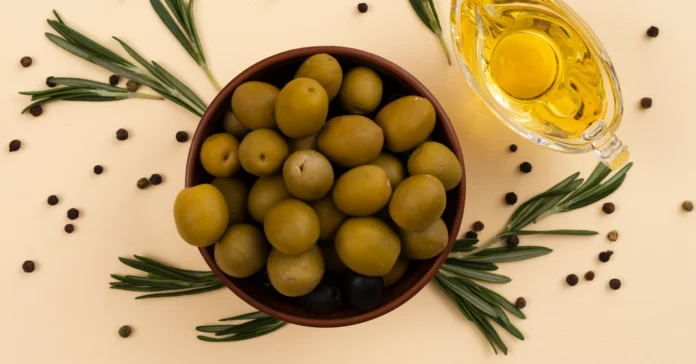
Good for heart health: Olives are rich in monounsaturated fats
wellhealthorganic.com:11-health-benefits-and-side-effects-of-olives-benefits-of-olives Olives are a delicious and healthy addition to any diet. They are particularly rich in monounsaturated fats, which have been shown to have a beneficial effect on heart health. These healthy fats can help to lower LDL (bad) cholesterol levels in the blood, which can reduce the risk of heart disease and stroke.
In addition to their heart-healthy fats, olives are also a good source of antioxidants, which can help to protect against oxidative stress and inflammation in the body. They also contain a range of other nutrients, including vitamin E, iron, and fiber, which can contribute to overall health and well-being.Overall, adding olives to your diet can be a great way to support heart health and improve your overall health and wellness.
Know about Olives
Olive fruit is the edible part of the olive plant, which belongs to the Oleaceae family. The fruit can be eaten raw or processed into oil, pickles, or other products. Olive oil is one of the most widely used vegetable oils in the world and has many health benefits. Figaro Oil is a brand of olive oil that originated in Spain and is now widely used in India. It is made from refined olive oil and virgin olive oil and is, according to ” wellhealthorganic.com:11-health-benefits-and-side-effects-of-olives-benefits-of-olives” characterized by a mild taste and aroma. This oil can be used for cooking, baking, salad dressing, or as a moisturizer for skin and hair.
Also Read: wellhealthorganic.com:11-health-benefits-and-side-effects-of-olives-benefits-of-olives
Health Benefits of Olives
- Based on wellhealthorganic.com:11-health-benefits-and-side-effects-of-olives-benefits-of-olives, Olives are good for your heart. Olives contain monounsaturated fatty acids (MUFAs), which can lower your bad cholesterol (LDL) and raise your good cholesterol (HDL). MUFAs can also prevent blood clots and reduce inflammation, lowering your heart disease and stroke risk. It is therefore suggested to infuse olive Oil uses in your daily routine.
- Olives are suitable for your skin. Olives are rich in vitamin E, a powerful antioxidant that can protect your skin from oxidative damage caused by free radicals. Vitamin E can also moisturize your skin, improve its elasticity and reduce the signs of aging: a report on www.wellhealthorganic.com titled 11-health-benefits-and-side-effects-of-olives-benefits-of-olives
- Olives are suitable for your eyes. Olives contain lutein and zeaxanthin, two carotenoids that can protect your eyes from blue light and UV rays. These carotenoids can also prevent macular degeneration and cataracts, common eye diseases that can impair vision.
- Olives are suitable for your immune system. Olives contain polyphenols, which are plant compounds with anti-inflammatory and antimicrobial properties. Polyphenols can modulate your immune system and fight off infections by inhibiting the growth of harmful bacteria and viruses.
- Olives are suitable for your brain. Olives contain oleic acid, a type of MUFA that can cross the blood-brain barrier and nourish your brain cells. Oleic acid can also improve your memory, learning, and cognitive function by enhancing the communication between neurons.
Side Effects of Olives
- Olives may cause allergic reactions. Some people may be allergic to olives or their components, such as pollen or Oil. This can cause itching, swelling, hives, rashes or anaphylaxis (a severe allergic reaction that can be life-threatening).
- Olives may cause stomach upset. Some people may experience stomach discomfort or diarrhea after eating olives, especially if they eat too many or are not used to them. This may be due to the high fat or fiber content of olives or the presence of some compounds that may irritate the digestive tract.
- Olives may contain high amounts of salt or additives. Most olives are cured or processed with salt or other additives, such as vinegar or lye, to enhance their flavor and shelf life.
Do you Know the Benefits of Jaitun Oil
Olive oil, also known as Jaitun Oil in Hindi, is a versatile oil that can be used for various purposes. It is extracted from the fruits of the olive tree, which is native to the Mediterranean region. Olive oil has many health benefits for the skin, hair, and nails, as well as for cooking and dressing salads. Here are some of the advantages of using Jaitun Oil:
- Olive oil moisturizes the skin and fights signs of aging, and it contains vitamin E and antioxidants that protect the skin from free radical damage and improve its elasticity. Olive Oil also helps to heal dry and cracked skin, especially on the lips, heels, and cuticles.
- Olive oil improves skin health and prevents acne, and it has anti-inflammatory and antibacterial properties that reduce inflammation and infection on the skin. Olive Oil also balances the skin’s natural oil production and prevents clogged pores.
- Olive oil keeps hair healthy and shiny, nourishing the hair follicles and strengthening the hair shafts. Olive Oil also helps to prevent hair loss, dandruff, and split ends. It can be used as a natural conditioner or a hair mask to hydrate and soften the hair.
- Olive oil helps to remove makeup and cleanse the face, and it dissolves dirt, oil, and makeup residue on the skin without stripping its natural moisture. Olive Oil can be used as a gentle makeup remover or cleansing oil to purify the skin.
Jaitun Oil for Immunity Boost
It boosts immunity and reduces the risk of cancer, and it contains omega-3 fatty acids and polyphenols that modulate the immune system and fight inflammation. Olive Oil also inhibits the growth of cancer cells and protects against colon and bowel cancer.
Olive Oil, according to wellhealthorganic.com:11-health-benefits-and-side-effects-of-olives-benefits-of-olives is a natural beauty booster that can be used for various purposes. It is available in different grades, such as extra virgin, virgin, pure, refined and pomace, depending on the quality and processing of the olives. Extra virgin olive oil is considered the best for health and beauty, as it is unrefined and has the highest amount of nutrients and antioxidants. Olive Oil can be stored in a cool and dark place for up to two years.
Do Black Olives Have the Same Nutritional Benefits as Green Olives?
Black olives are a delicious and nutritious snack with many health benefits. Here are some of the reasons why you should include black olives in your diet:
- Black olives are a good source of monounsaturated fats, which can lower harmful cholesterol levels and improve your heart health.
- Black olives are rich in vitamin E, an antioxidant that protects your cells from damage and inflammation, and vitamin E also helps prevent skin aging and cancer.
- Black olives provide fiber, aiding digestion, lowering blood pressure, and keeping you full for longer.
- Black olives contain iron, which is essential for producing red blood cells and transporting oxygen throughout your body.
- Black olives have anti-inflammatory properties, which can help reduce the symptoms of arthritis, asthma, and other chronic conditions.
To enjoy the benefits of black olives, you can eat them as a snack, add them to salads, sandwiches, pizzas, or pasta dishes, or make a tasty tapenade by blending them with garlic, lemon juice, and olive oil. Black olives, according to wellhealthorganic.com:11-health-benefits-and-side-effects-of-olives-benefits-of-olives are versatile and flavorful, so you can easily incorporate them into your meals. However, be mindful of the sodium content of canned or jarred black olives, and rinse them before eating to reduce the salt intake.
Olives and Weight loss
Olives are a tasty and nutritious fruit that can help you lose weight by providing healthy fats and low-calorie density. They are also rich in antioxidants that may protect your cells from damage and inflammation. However, olives are also high in sodium and calories, so you should eat them in moderation and choose the type that suits your preferences and goals. For example, Greek-style black olives have more phenols than green or California-style olives, but they also have more sodium. You can enjoy olives as a snack or add them to salads, pizzas, pasta dishes, or sandwiches for a burst of flavor and health benefits.
Uses of Olive as “Smart Drugs”
Olive is a tree that produces edible fruit, leaves, and seeds with various health benefits. By Wellhealthorganic.com:11-health-benefits-and-side-effects-of-olives-benefits-of-olives, some people use olives as a natural nootropic or intelligent drug to enhance their cognitive performance and protect their brain from aging and stress.
- Olive Oil, extracted from the fruit, is rich in monounsaturated fatty acids that can lower cholesterol levels and reduce the risk of heart disease and stroke. Olive Oil also contains antioxidants, such as vitamin E and polyphenols, that can protect the brain cells from oxidative damage and inflammation. Some studies suggest olive Oil may improve memory and thinking skills, especially in older adults.
- Olive leaf, often taken as a supplement, has antibacterial, antifungal, and antiviral properties that can help fight infections and boost immunity. The leaves of Olives also contain oleuropein, which can lower blood pressure and relax blood vessels. They have neuroprotective effects, as some animal studies have shown they can prevent cognitive decline and Alzheimer’s disease.
- Olive seeds, sometimes ground into a powder, are a good source of fiber, protein, and minerals, such as calcium, magnesium, and iron. Olive seeds may also have antioxidant and anti-inflammatory effects that can benefit the brain and overall health.
Olive is generally safe to use as a food or supplement, but it may interact with some medications, such as blood thinners, diabetes drugs, or blood pressure drugs. Therefore, it is advisable to consult a doctor before using olive as a smart drug.
How is Vitamin E related to olive Oil
Vitamin E is a nutrient that has antioxidant properties and helps to protect the cells from free radical damage. It also supports the immune system, vision, reproduction and skin health. Olive Oil, according to wellhealthorganic.com:11-health-benefits-and-side-effects-of-olives-benefits-of-olives is one of the sources of vitamin E in the diet. The type of vitamin E found in olive Oil is alpha-tocopherol, the body’s most active form of vitamin E. One tablespoon of olive oil contains about 10 percent of the daily value of vitamin E for adults, which is 15 milligrams per day. Olive Oil also contains other beneficial nutrients, such as vitamin K and omega-3 and omega-6 fatty acids. However, olive Oil is high in calories and fat, so it should be consumed in moderation as part of a balanced diet. Vitamin E also prevents rancidity in olive Oil, which extends its shelf life and preserves its quality.
Olive oil and Lemon oil: what’s the connection?
Lemon and olive oil are natural products with many health benefits and culinary uses. Lemon oil is extracted from the peel of lemons and citrus fruits and contains vitamin C, flavonoids, and antioxidants. Olive Oil is obtained from the ripe fruits of olive trees, which are rich in monounsaturated fatty acids, polyphenols, and vitamins E and K.
Lemon and olive oils can be used separately or together for various purposes. Together, lemon and olive oil can be used to make a homemade dressing, marinade, or sauce for salads, pasta, fish, and vegetables. They can also be used to make a detox drink that may help cleanse the liver and gallbladder.
To make lemon-infused olive oil, either cold-press lemons with olives or heat the olive oil with lemon peel. To make a detox drink, mix one tablespoon of olive oil with one tablespoon of lemon juice and drink it on an empty.
Final Words
According to wellhealthorganic.com:11-health-benefits-and-side-effects-of-olives-benefits-of-olives, we can conclude Olives are a nutritious and delicious fruit. However, olives also have potential side effects, such as causing digestive discomfort and interacting with medications. Some are crucial, like increasing sodium intake, triggering acid reflux, and causing skin reactions. Therefore, it is vital to consume olives in moderation and consult your doctor before consuming them.

